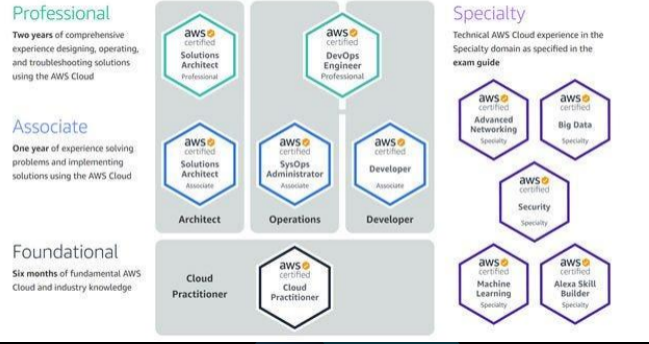Databases
RDS (Relational Database Service): Allows you to run relational databases like MySQL, MariaDB, PostgreSQL, Oracle or SQL Server. These databases are fully managed by AWS like installing antivirus and patches.
DynamoDB: It is a highly scalable, high-performance NoSQL database. It provides single-digit millisecond latency at any scale.
Elasticache: It is a way of caching data inside the cloud. It can be used to take load off of your database by caching most frequent queries.
Neptune: It has been launched recently. It is a fast, reliable and scalable graph database service
RedShift: It is AWS’s data warehousing solution that can be used to run complex OLAP queries.
Demand for AWS Jobs Outstrips Available Professionals
In the public cloud job market, there are between six to 12 times more job postings available than there are job seekers, and 60 percent of these job postings are AWSrelated. Employers in the United States, for example, say that it’s quite a challenge finding professionals with cloud computing skills in general. This imbalance will continue to be the case for a long time to come.
Whether you’re already an experienced IT professional seeking to take your career in a new direction or new to cloud computing (or IT, for that matter), there are several reasons why you should consider AWS. And since AWS is the leading public cloud computing service that is widely adopted by organizations both large and small, then it also follows that learning AWS has become a necessity for IT professionals who want to secure their future careers come.
How to Learn AWS
Now that you have some solid reasons why an AWS career can be beneficial, the next step is to find out how you can go about acquiring the necessary knowledge, skills, and certifications for AWS.
There is an Abundance of AWS Learning Resources:
Since AWS certifications were first introduced in 2013, a lot of resources have been made available ranging from books, manuals, courses, AWS practice exams, and AWS communities. These resources are all useful for those
seeking to start and grow their career in AWS. However, choosing the right learning resource is critical since there is a lot to go through since some courses are simply better than others.
Bonus: AWS Certifications
AWS certifications are divided into four major categories Foundational, Associate, Professional, and Specialty.

Choose a Career Path that Suits You Best
There are a lot of AWS career paths from which you can choose. The career path you want can be based on either:
The Role: Such as cloud practitioner, operations, architect, and developer.
The Solution: Such as storage, machine learning, and AWS media services.
You could also choose a specialty area on which to focus your attention and validate advanced skills in specific technical domains.


